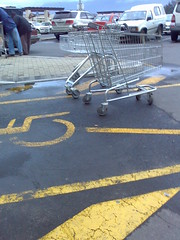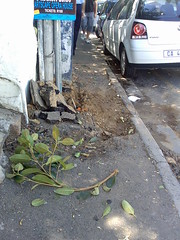Stem Cell Ethical Concerns
This particular post should be read after (at least!!) reading the previous 3 posts - Stems Cells 101, & the Potential Impact of Stem Cell Research Part1 & Part2.
I shall try to outline some of the concerns surrounding this issue. Again, this is done in a rather over-simplified manner.
Of course, I think almost everyone involved or interested in the whole debate, is hoping that the recent research where adult stem cells, or even cells harvested from the umbilical cord will prove to be a successful route in the future. This technique should remove many (but not quite all) of the concerns that people have on the issue. I promise you that no scientist is choosing to research this area because of the ethical issues, or merely to make use of spare blatocysts that there may be in his lab. Every researcher I have met in this field is fully aware of the sensitive nature of the research. Certainly none of them are the evil mad scientists, that some sections of the popular media try to portray them as! (Well OK, I cannot comment on some of the North Korean labs…)
The main concerns are:
- Human embryonic stem cell research involves the destruction of a blatocyst, which some people regard as a human life.
- Some people have an issue with creating a blatocyst with the sole intention of destroying it.
- A concern is that this research could lead to the exploitation of women, as more and more donor oocytes may be needed.
- Some people object to the mixing of human and non-human genetic material in the research.
- Some sections of society even have objections to any advances in not only stem cell research, but genetics, molecular biology, and many other similar medical interventions are manipulations which undermine human dignity.
- There are other concerns, certainly but I hope this touches on the main ones.
Any research on human embryos is going to raise profound questions about the status of the human embryo, the extent to which it is justifiable to use human embryos to expand knowledge and ameliorate human suffering, and the conditions under which these goals may be pursued. Many people hold the view that a human embryo (of any stage) is morally equivalent to a human life. Some claim that any manipulation of a human embryo undermines human dignity. These are philosophical views which should not just be ignored. However, these philosophical views do not always manifest themselves culturally in our societies. A natural miscarriage (which, I have had the misfortune to witness) is a harrowing experience, but we do not conduct a funeral afterwards. Similarly, for most couples, the excess blatocysts from IVF treatments can be disposed of without any need for ceremony or specific interventions that we may feel appropriate for, say, the death of a child. Many religions do not recognise the human embryo as human life until a specific stage (around 40 days after conception).
I do feel that any discussion on the ethics of stem cell research should respect these deeply held views. But I do not feel that these, alone, should bring all research in these matters to a complete halt, as the potential benefits to so many people are so huge. But I do feel that these views should assist us in developing workable ethical codes, which take into account the special status of the human embryo, and try to protect that status in a serious manner.
An excellent overview can be read at
http://books.nap.edu/openbook.php?record_id=11278&page=47















